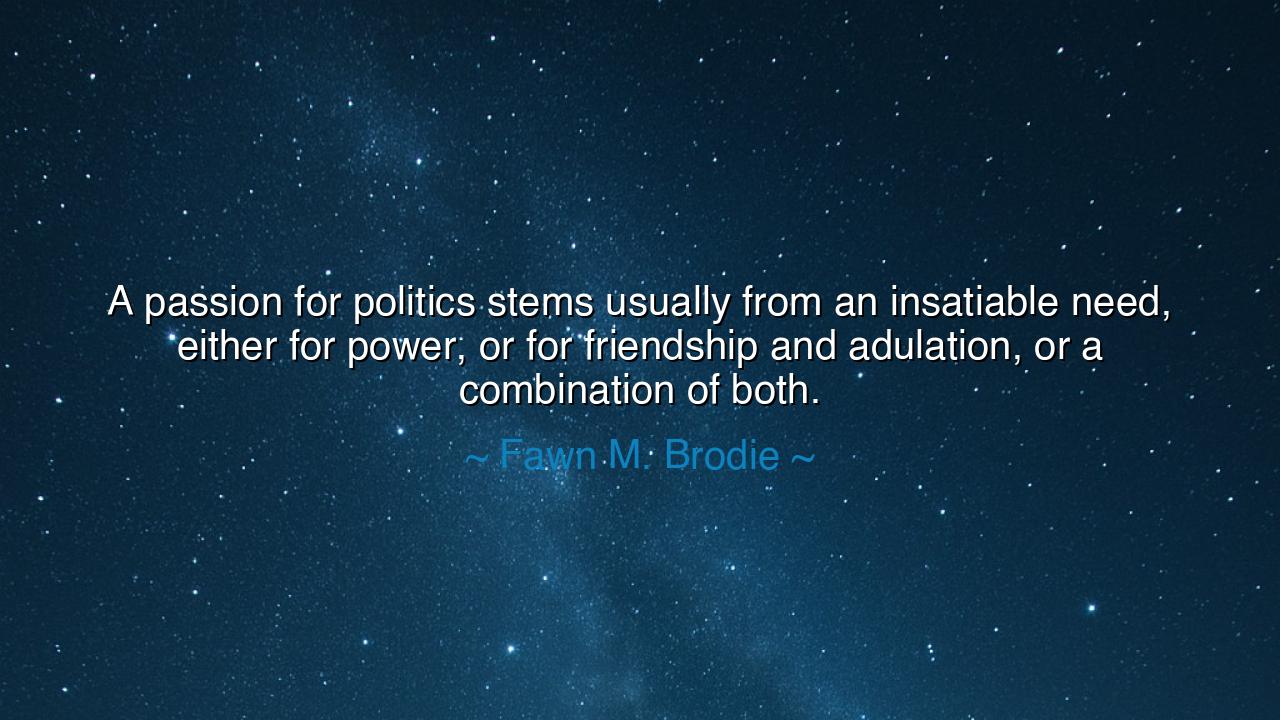
A passion for politics stems usually from an insatiable need
A passion for politics stems usually from an insatiable need, either for power, or for friendship and adulation, or a combination of both.






Listen, O seeker of truth, to the penetrating insight of Fawn M. Brodie: “A passion for politics stems usually from an insatiable need, either for power, or for friendship and adulation, or a combination of both.” Here is a truth as ancient as the councils of kings and the assemblies of sages: the heart that pursues governance is rarely motivated solely by abstract ideals. Within the human breast, the drive for power, the yearning for admiration, and the longing for alliances and friendship intertwine, compelling some to the arena of politics with a force as relentless as the tide. Brodie’s words reveal not merely the external structures of governance, but the hidden currents that propel human ambition within them.
The origin of this observation emerges from Brodie’s study of historical figures, particularly her examinations of those whose lives intertwined with leadership, influence, and public scrutiny. She recognized that politics is often a mirror of the soul, reflecting the deepest desires and vulnerabilities of those who seek its stages. The passionate politician may be driven by a craving for power, the intoxicating ability to shape destinies; by the need for friendship and adulation, the affirmation of worth through the eyes of others; or by a complex fusion of both. In this light, the study of political fervor becomes a study of human psychology itself.
Consider the duality of such motivation. Power offers dominion and the authority to shape the course of events. Yet without friendship or admiration, the grasp of influence may leave the soul hollow, disconnected from the fellowship of others. Conversely, the desire for adulation and friendship without power may render one vulnerable, dependent on the shifting tides of approval. Those who balance both desires, often unconsciously, become the titans of political ambition, capable of shaping nations, for better or worse, as the fires of human aspiration guide them.
History provides ample testimony. Reflect upon Julius Caesar, who strode through the streets of Rome, beloved by the people yet driven by an insatiable hunger for power. His alliances, friendships, and cultivated admiration were tools and sustenance alike, enabling him to navigate the treacherous currents of the Roman Senate. Yet even Caesar’s brilliance could not shield him from the envy and betrayal of those who recognized the depths of his ambition. Brodie’s observation is made flesh in his story: the passion for politics is rarely pure, but always potent.
Yet there are those whose admiration and friendship drive political pursuit in nobler forms. Consider Abraham Lincoln, who, though conscious of authority, was deeply motivated by a desire to preserve union and cultivate trust among allies. His political passion was inseparable from the bonds he formed, the counsel he sought, and the moral responsibility he bore. Here, the intertwining of power and human connection elevated ambition into service, demonstrating that the dual impulses Brodie identifies can be harnessed with wisdom for the good of many.
The insight of this reflection is both cautionary and illuminating. The passions that propel one into politics are not inherently corrupt, but they demand self-awareness. When ambition is guided solely by desire for power, cruelty and tyranny may follow. When driven only by craving for adulation, vanity and weakness may ensue. Yet when one discerns and balances these forces, ambition can serve a higher purpose, transforming personal desire into enduring contribution.
From these reflections emerges a clear lesson: recognize the motives that drive your ambitions, whether in politics, leadership, or any endeavor. Practical actions follow: reflect deeply upon the impulses behind your pursuits, cultivate ethical discernment, seek allies not merely for flattery but for counsel, temper the hunger for recognition with humility, and wield influence as a servant of principle rather than a slave to ego. In this balance, the fires of ambition illuminate rather than consume.
Thus, as the ancients might counsel, heed Fawn M. Brodie’s teaching: the passions that draw humans to positions of authority are intertwined with the very fibers of the soul—power, friendship, and adulation. To navigate them wisely is to master oneself before seeking to master the world. Let ambition be tempered by reflection, let alliances be forged with integrity, and let the pursuit of influence honor both the heart and the greater good, for therein lies the enduring mark of a life both powerful and virtuous.






AAdministratorAdministrator
Welcome, honored guests. Please leave a comment, we will respond soon